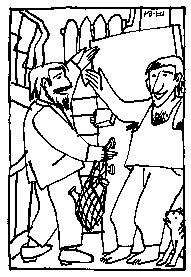
2) Realizing that to pursue his hobby and life's dream he must go abroad, Bulgakov spends two years applying for and obtaining a foreign passport and visa for England. (Why England? Well - Bulgakov has always been a great admirer of Charles Dickens, the English Dostoyevsky; he thinks that he will be quite at home in the London fogs). Then he finds out that there are no real mountains in England either. 'I'm just a mudak(1)' he says to his friends for the next two weeks; 'I'm never going to go anywhere'.
3) To make matters worse, a new Russian law has rendered his passport invalid: all passports with the old Soviet crest must be exchanged for new ones with the new Russian crest. However, when Bulgakov gets his new passport six months later, it still bears the Soviet crest and is identical to his old passport in all but one respect - its validity.
4) Bulgakov gives up his job as a nightwatchman in order to devote himself full time to the task of securing a visa (this time to France). This is the wrong thing to do: foreign embassies are automatically more suspicious of those without jobs or wives to come back to, as such types obviously intend to make their fortune scrubbing dishes for sixteen hours a day and half pay in a cockroach-infested restaurant in Montmartre or Soho. When a friend points this out to him, Bulgakov again declares, 'I'm not going anywhere. I'm just a mudak.'
5) Another of Bulgakov's friends, Masha Shukina, takes him in hand and writes a letter to the French Embassy in Moscow. The letter says: 'This is my friend Sasha Bulgakov. He has no job at the moment, but don't let that worry you. Just take one look at him and you'll see that he is quite incapable of doing anything for which anyone might be willing to pay money. He has difficulty enough getting himself employed in Russia, where at least he can speak the local language. If he manages even to get himself to your embassy in Moscow today, it should be counted a miracle of the highest order.' The official at the French embassy in Moscow takes one look at Bulgakov and gives him a visa.
6) Before leaving for the airport, Bulgakov spends three days wondering what to pack: should he take his old samizdat manuscript of Brodsky or the riveting new edition of de Sade's Juliette; three small boxes of matches or one large one; the plain medium-sized tea pot or the large baroque pot with the baroque handle and spout? When, on the third and final day, he has eventually made up his mind on all these points, it turns out he has overestimated his baggage allowance - by five times. He dumps the large baroque teapot and matching samovar, squeezes everything else into six plastic bags, locks the door to his flat and, running - because he is now almost certainly going to be late - falls into an open drain in the courtyard to his house, breaking a leg.
